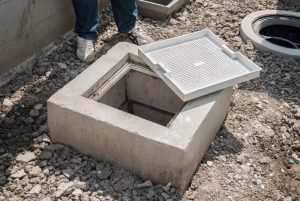 If you run a restaurant in the St. Louis area, then you undoubtedly have a lot on your plate—pun intended. The good news is, for all your plumbing needs, all you need to do is give our team a call. This is true for your piping needs, as well as things like grease traps.
If you run a restaurant in the St. Louis area, then you undoubtedly have a lot on your plate—pun intended. The good news is, for all your plumbing needs, all you need to do is give our team a call. This is true for your piping needs, as well as things like grease traps.
Grease traps are something a lot of our customers have questions about, and we’re here to answer those questions. If there’s anything we haven’t covered below that you’d like to know more about, please don’t hesitate to give us a call!
First, What Is the Purpose of a Grease Trap?
Also referred to as grease interceptors, the grease trap is a plumbing attachment that does exactly what the name implies. It traps grease in order to prevent it from traveling from your drains to the public sewage system.
Grease traps contain components called baffles, which separate out fats, oils, and grease (FOG) from the wastewater, and allow these lighter-than-water materials to float to the top of the trap, letting water continue into the sewer system.
Yes, Grease is Serious
Another question we get is if grease is really that bad of a problem. The thing is, FOG appears harmless in hot liquid form, but this is the trick. When FOG cools off, it solidifies and congeals. This can quickly lead to pipe blockage.
With a commercial kitchen, where a large amount of FOG goes down the drains daily, this can mean trouble for the city’s wastewater system, and it can mean environmental harm. A grease trap isn’t just protecting your business’s plumbing—it’s protecting the community’s plumbing.
So, if your business is a restaurant or a food service establishment of any kind, you absolutely need a grease trap in place. Some businesses are exempt, such as residential properties where food prep happens, but food isn’t sold from.
When it doubt on whether it’s required for your business, be sure to call on a licensed commercial plumber who is familiar with the local code requirements. The last thing you need is for your foodservice company to be shut down due to a health code violation that would have been easy to avoid.
“I Think I Already Have a Grease Trap, Right?”
You might! The most popular type of grease trap is an under-the-counter system. This sounds easy to spot, but it actually might not be. We recommend that you check on a plumbing schematic for your facility, if there is one, and the grease trap should be marked here.
There are also larger outside grease traps buried in the ground, and you should find this marked on the schematic, too. If you don’t have this available, of you don’t otherwise know if your business has a grease trap, the best thing to do is contact our plumbers to help you out.
Invest in Grease Trap Maintenance
Grease traps must be regularly cleaned out, and checked for proper operation. Maintenance isn’t something you should do on your own—in fact, we’d wager that you wouldn’t want to anyway! Just give our commercial plumbers a call for this job.
To learn more about grease traps in St. Louis, MO and to schedule service for yours, contact Performance Plumbing today.
